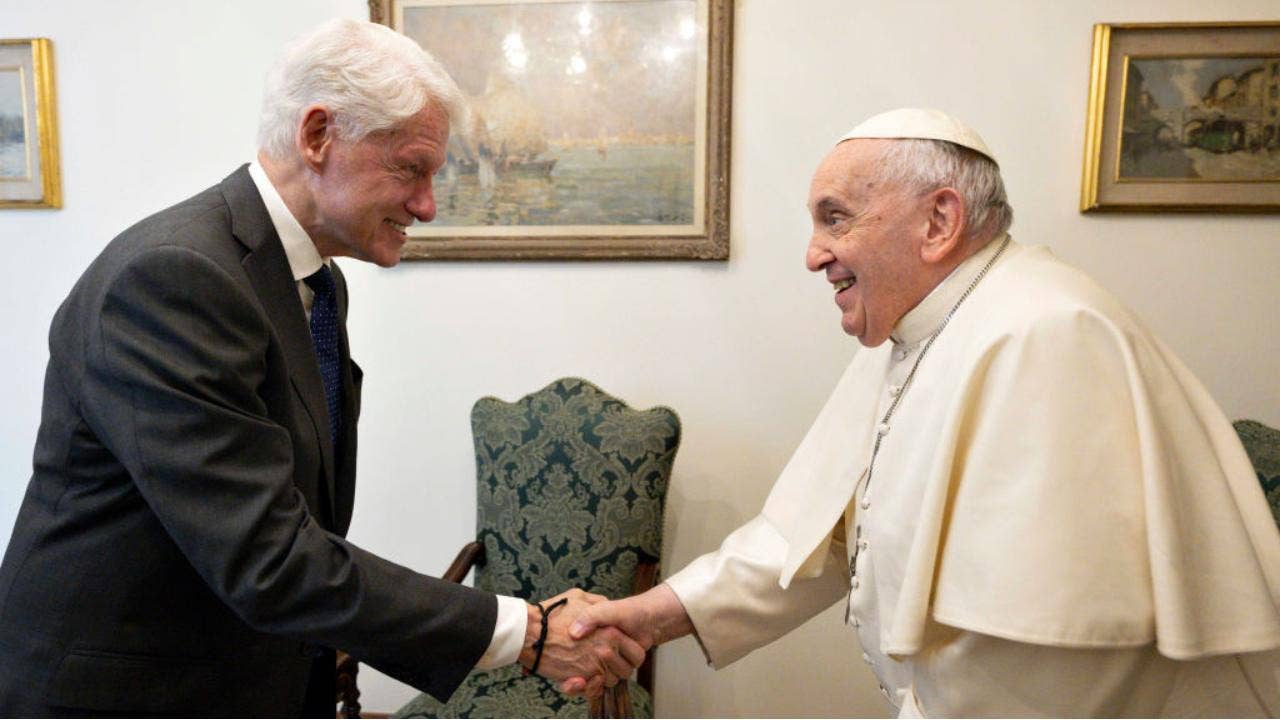When Pope Francis speaks, the world listens. But what happens when the Pope's message echoes themes that some associate with Marxism? The intersection of Pope Francis and Marxism has sparked debates, inspired curiosity, and raised questions about faith, economics, and social justice. Is the Pope a Marxist? Or is he simply calling for a more compassionate world?
Pope Francis, the first Jesuit pope and the first pope from the Americas, has been a vocal advocate for the poor and marginalized. His speeches often emphasize the need for economic equality and social justice, which has led some to label him as a Marxist. But is this label accurate? Let's dive into the conversation and explore the nuances of his teachings.
In this article, we'll examine the relationship between Pope Francis and Marxism, breaking down his views on economics, social justice, and the Church's role in addressing global issues. Whether you're a devout Catholic, a political enthusiast, or simply curious about the intersection of religion and politics, this article will provide insights you won't find elsewhere. So, grab your coffee, and let's get started!
Read also:Travis Kelces Choice Affects Swift A Deep Dive Into The Relationship Drama
Table of Contents
- Biography of Pope Francis
- What Is Marxism?
- Pope Francis' Message on Social Justice
- Marxism vs. Pope Francis: Key Differences
- Economic Views of Pope Francis
- Criticism and Misconceptions
- Support for Pope Francis' Views
- Global Impact of Pope Francis' Teachings
- Where Is the Church Heading?
- Conclusion: What Does It All Mean?
Biography of Pope Francis
Pope Francis: The Man Behind the Mitre
Born Jorge Mario Bergoglio on December 17, 1936, in Buenos Aires, Argentina, Pope Francis is a man of humble beginnings. Before becoming pope, he was a chemist, a teacher, and eventually, a cardinal in the Catholic Church. His life journey reflects a deep commitment to service and humility, values that continue to shape his papacy.
Here's a quick glance at some key details about Pope Francis:
| Born | December 17, 1936 |
|---|---|
| Birthplace | Buenos Aires, Argentina |
| Ordained as Priest | December 13, 1969 |
| Became Archbishop of Buenos Aires | February 28, 1998 |
| Elected as Pope | March 13, 2013 |
What Is Marxism?
Understanding the Basics of Marxism
Marxism is a political and economic theory developed by Karl Marx and Friedrich Engels in the 19th century. At its core, Marxism advocates for a classless society where wealth and resources are distributed equally among all people. It critiques capitalism, arguing that it perpetuates inequality and exploitation.
Some key principles of Marxism include:
- Elimination of private property
- Worker ownership of production
- A classless, stateless society
- Critique of capitalism's focus on profit over people
While Marx's ideas have influenced various movements around the world, they have also been controversial. Critics argue that Marxist theories, when implemented, often lead to authoritarian regimes and economic inefficiency. But is Pope Francis really a Marxist? Let's explore further.
Pope Francis' Message on Social Justice
Calling for a World of Compassion
Pope Francis has consistently emphasized the importance of social justice and care for the marginalized. In his landmark encyclical, "Laudato Si'," he addresses environmental degradation and its impact on the poor, calling for a more sustainable and equitable world. His message resonates with many, but it has also sparked debates about its alignment with Marxist principles.
Read also:Idaho Murder Roommates Phone Revealed
Some of the key themes in Pope Francis' teachings include:
- Care for the environment and the poor
- Rejection of unchecked capitalism
- Advocacy for economic equality
- Emphasis on human dignity and solidarity
While his message aligns with some aspects of Marxism, such as critiquing economic inequality, Pope Francis' approach is rooted in faith and compassion rather than political ideology.
Marxism vs. Pope Francis: Key Differences
Where Do They Diverge?
Despite the similarities in their critiques of capitalism, there are significant differences between Marxism and Pope Francis' teachings. For one, the Pope rejects the elimination of private property, a cornerstone of Marxist theory. Instead, he advocates for responsible stewardship of resources, emphasizing the role of faith and morality in shaping economic systems.
Another key difference lies in their views on religion. Marxism is inherently secular and often critical of organized religion, while Pope Francis is a devout Catholic who sees faith as central to addressing social issues. His approach is rooted in the Gospel's call to love and serve others, rather than a purely political agenda.
Economic Views of Pope Francis
A Vision for a Fairer World
Pope Francis' economic views are shaped by his experiences growing up in Argentina and his work as a pastor in Buenos Aires. He has been vocal about the need for economic systems that prioritize people over profit, advocating for policies that reduce inequality and protect the environment.
In his apostolic exhortation "Evangelii Gaudium," he warns against the "tyranny of money" and calls for a "new culture of work, solidarity, and human dignity." His vision for economic reform emphasizes collaboration, compassion, and a commitment to the common good.
Criticism and Misconceptions
Why Some Call Him a Marxist
Not everyone agrees with Pope Francis' views, and some have labeled him a Marxist. Critics argue that his critiques of capitalism and calls for economic equality echo Marxist principles. However, this label oversimplifies his message and ignores the religious and moral foundations of his teachings.
Others have accused him of being "anti-capitalist," but Pope Francis has repeatedly stated that he is not opposed to capitalism itself. Instead, he critiques its excesses and calls for a more humane and equitable economic system. His message is one of balance and compassion, not radical change.
Support for Pope Francis' Views
Why Many Agree with Him
Despite the criticism, many people around the world support Pope Francis' message. His emphasis on social justice, care for the environment, and compassion for the marginalized resonates with those who seek a more equitable and sustainable world.
Supporters argue that Pope Francis is simply calling for a return to the Church's traditional teachings on social justice and care for the poor. His message is grounded in faith and morality, rather than political ideology, making it relevant to people of all backgrounds.
Global Impact of Pope Francis' Teachings
Changing the World, One Heart at a Time
Pope Francis' teachings have had a profound impact on the global stage. His calls for action on climate change, economic inequality, and social justice have inspired movements and policies around the world. Leaders from various fields have praised his vision for a more compassionate and equitable world.
For example, his encyclical "Laudato Si'" has been credited with influencing the global conversation on climate change, leading to increased awareness and action. His advocacy for the poor and marginalized has also inspired grassroots movements and charitable initiatives worldwide.
Where Is the Church Heading?
A Vision for the Future
Under Pope Francis' leadership, the Catholic Church is moving in a direction that emphasizes compassion, inclusivity, and social justice. His reforms and teachings reflect a desire to reconnect with the Church's roots and address the challenges of the modern world.
While some within the Church have resisted his reforms, many see them as necessary steps toward a more relevant and compassionate institution. The future of the Church under Pope Francis is one of hope, renewal, and a commitment to serving the needs of all people.
Conclusion: What Does It All Mean?
In conclusion, the relationship between Pope Francis and Marxism is more complex than a simple label can capture. While his critiques of capitalism and calls for economic equality may echo some Marxist principles, his teachings are rooted in faith, compassion, and a commitment to the common good.
As we navigate the challenges of the modern world, Pope Francis' message offers a vision of hope and renewal. Whether you agree with him or not, his call for a more compassionate and equitable world is one that resonates with people of all backgrounds. So, let's keep the conversation going. Share your thoughts in the comments, and don't forget to check out other articles on our site for more insights!


